Introduction
“If you would understand anything, observe its beginning and its development.”
–Aristotle
Historians have used many lenses to analyze how historical change comes about. Thomas Carlyle, the 19th-century British writer, famously defined history as “at bottom the History of the Great Men who have worked there,” and he saw heroic individuals as the drivers of change. In the 20th century, the French school of historians known as the Annales (for the journal where they published) reacted against Carlyle and other traditional historians who had presented history as largely a chronicle of wars and political events. In their quest for the roots of historical change, the Annales historians focused on the everyday lives of ordinary people in centuries long past.
Other recent historians have examined technology as a driving force or analyzed the effects of climate, natural resources, and environmental devastation. Under “theories of history,” the online encyclopedia Wikipedia currently provides 121 listings.
In this book, we use a different lens – what might be called the tipping-point theory of history, a term borrowed from a recent best-seller in the United States written by the journalist Malcolm Gladwell.
“The ‘Tipping Point’… comes from the world of epidemiology,” writes Gladwell. “It’s the name given to that moment in an epidemic when a virus reaches critical mass. It’s the boiling point. It’s the moment on the graph when the line starts to shoot straight upwards.” Gladwell adds, “One of the things I explore in the book is that ideas can be contagious in exactly the same way that a virus is.”
Our premise in this book is that by analyzing a few tipping-point events, one can come to a better understanding of not only how the United States became the country it is today but of the values woven into this nation’s fabric. From the viewpoint of the present, it is easy to forget that, just 200 years ago, the United States was a fledgling democracy, the recently liberated colony of a world power, with a backwoods economy based on agriculture and exploitation of its natural resources. It’s also easy to forget that the institutions, ideas, laws, and values that govern the United States in the present were the creations of individual human beings in a specific set of circumstances.
We asked 11 historians, each an expert in his field, to consider a development that led to the creation of an idea or an institution that is central to America today. Most of the time, our authors find that a heroic individual plays a distinct role: George Washington’s decision to retire from the first presidency after two terms guaranteed that the new nation would not have a king. The 1954 Supreme Court decision that led to racial integration of American schools is hard to imagine without Earl Warren as chief justice. The Marshall Plan, which helped bring relief to a devastated Europe after World War II, is certainly well named.
Yet it is also possible to see less personalized and less dramatic transformative events – laws passed by Congress, court decisions, the development of public schools – as examples of the tipping-point theory in action. They occur at times when an accretion of ideas, social movements, economic interests, and other forces have attained a critical mass. When looked at closely, many sudden transformations do not turn out to be sudden.
We do not mean to suggest that historical tipping points occur only in America, of course. By telling these American stories, we hope to provide ways for readers to view history, societies, and institutions in a new light of understanding.
iii
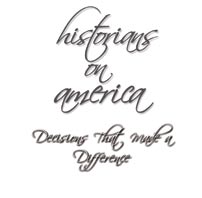
iv

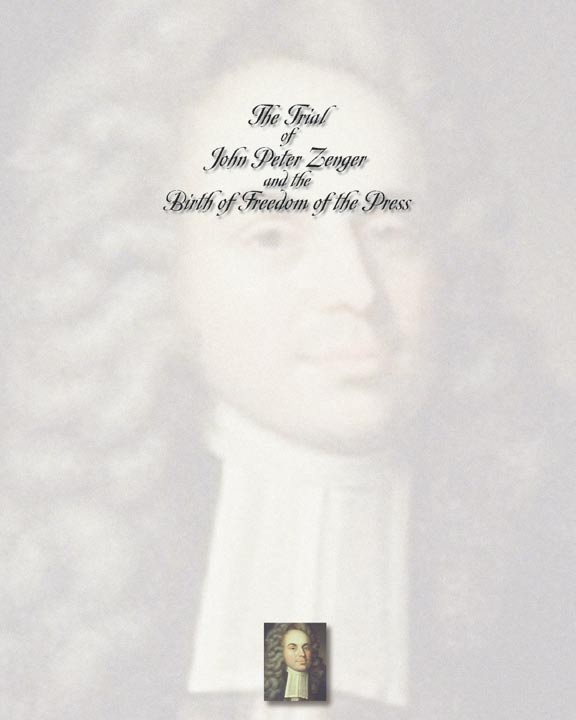
by Doug Linder
NO COUNTRY VALUES FREE EXPRESSION MORE HIGH-
LY THAN DOES THE UNITED STATES, AND NO CASE IN
AMERICAN HISTORY STANDS AS A GREATER LANDMARK ON
THE ROAD TO PROTECTION FOR FREEDOM OF THE PRESS
THAN THE TRIAL OF A GERMAN IMMIGRANT PRINTER
NAMED JOHN PETER ZENGER. ON AUGUST 5, 1735, 12
NEW YORK JURORS, INSPIRED BY THE ELOQUENCE OF
THE BEST LAWYER OF THE PERIOD, ANDREW
HAMILTON, IGNORED THE INSTRUCTIONS OF THE
GOVERNOR’S HAND-PICKED JUDGES AND RETURNED
A VERDICT OF “NOT GUILTY” TO THE CHARGE THAT
ZENGER HAD PUBLISHED “SEDITIOUS LIBELS.” THE
ZENGER TRIAL IS A REMARKABLE STORY OF A DIVIDED
COLONY, THE BEGINNINGS OF A FREE PRESS, AND THE
STUBBORN INDEPENDENCE OF AMERICAN JURORS.
Andrew Hamilton, represented in this oil, helped establish freedom of the press in colonial America, by defending publisher John Peter Zenger against a charge of libel.
1

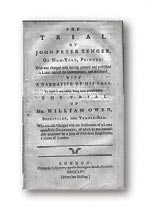
The Villainous Colonial Governor tion to his administration among some of the most powerful people in the colony. Rip Van Dam, Lewis Mor-
ris, and an energetic attorney named James Alexander
The man generally perceived to be the villain of the organized what came to be known as the Popular Party, a Zenger affair, William Cosby, arrived in New York on
political organization that would constitute a serious chal-
August 7, 1731, to assume his post as governor for New
lenge to Cosby’s ability to govern.
York Province, having been appointed by the Crown.
Cosby attempted to maintain his grip on power by
Cosby quickly developed a reputation as “a rogue gov-
employing Francis Harison – a man called by historians
ernor.” It is almost impossible to find a positive adjec-
Cosby’s “flatterer-in-chief” and “hatchetman”– to be
tive among the many used by historians to describe the
censor and effective editor of the only established New
new governor: “spiteful,” “greedy,” “jealous,” “quick-
York newspaper, the New York Gazette. Harison de-
tempered,” “dull,” “unlettered,” and “haughty” are a
fended Cosby both in prose and strained verse, such as
sample.
this poem that appeared in the Gazette’s January 7, 1734,
Within a year after arriving on American shores,
issue:
Cosby embroiled himself in a controversy that would
eventually lead to Zenger’s trial. Cosby
Zenger’s trial came when
Cosby the mild, the happy, good and great,
picked his first fight with Rip Van Dam, the
New York was still a British
The strongest guard of our little state;
71-year-old highly respected senior member
colony. Below: an account of the Let malcontents in crabbed language write, case printed in London in 1765.
of the New York provincial council. Cosby
And the D...h H...s belch, tho’ they cannot bite.
demanded that Van Dam turn over half of the
He unconcerned will let the wretches roar,
salary he had earned while serving as acting
And govern just, as others did before.
governor of New York during the year be-
tween Cosby’s appointment and his arrival in
Besieged by poetry, prose, and the threat of
the colony. The hard-headed Van Dam agreed
oppression, James Alexander, often described
– providing that Cosby also would agree to
as the “mastermind” of the opposition,
split with him half of the perquisites he earned
decided to take an unprecedented step by
during the same time period. By Van Dam’s
founding America’s first independent political
calculations, Cosby would actually owe him
newspaper. Alexander approached John Peter
money – over £4,000.
Zenger who, along with William Bradford, the
Governor Cosby responded in August 1732
Gazette’s printer, was one of only two print-
by filing suit for his share of Van Dam’s salary.
ers in the colony, with the idea of publishing
Knowing that he had no chance of prevailing
a weekly newspaper to be called the New
in his case if the decision were left to a jury,
York Weekly Journal. Zenger, who had made a
Cosby designated the provincial Supreme Court to sit
modest living the past six years printing mainly religious
as a “Court of Exchequer” (without a jury) to hear his
tracts, agreed. In a letter to an old friend, Alexander re-
suit. Van Dam refused to roll over, and had his lawyers
vealed the Journal’s mission: “Inclosed is also the first of
challenge the legality of Cosby’s attempt to bypass the
a newspaper designed to be continued weekly, chiefly to
colony’s established jury system. The decision on the
expose him [Cosby] and those ridiculous flatteries with
legality of Cosby’s meddling with the court system fell to
which Mr. Harison loads our other newspaper. ...”
the three members of the Supreme Court he was med-
On November 5, 1733, Zenger published the first
dling with, which voted 2 to 1 to uphold Cosby’s action.
issue of the Weekly Journal. The issue included
Despite winning in the Supreme Court, Cosby ex-
a detailed account of the victory the previous week of
pressed irritation that the vote for his plan was not unani-
Lewis Morris as Popular Party candidate for assembly-
mous. He wrote a letter to the dissenting judge, Chief
man from Westchester. Morris won the election despite
Justice Lewis Morris, demanding that he explain his vote.
the best efforts of Cosby to rig the election against him
Morris did so, but to Cosby’s great displeasure, his expla-
by having the sheriff disqualify Quaker voters (expected
nation appeared not in a private letter to the governor,
to be heavily pro-Morris) on the ground that the Quakers
but in a pamphlet printed by John Peter Zenger. Cosby
only “affirmed” rather than swore the oath required at
retaliated by removing Morris as chief justice, and replac-
the time of all voters. The election story, almost certain-
ing him with a staunch royalist, James DeLancey.
ly written by Alexander, included this description of the
Cosby’s firing of Morris intensified the growing opposi-
sheriff’s intervention:
2
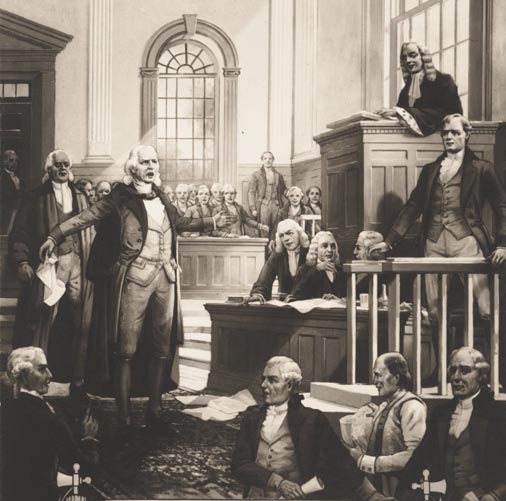
A posthumous depiction of the Zenger trial by illustrator David Lithgow. Little does the mincing Justice DeLancey, upper right, know he is soon to be overruled by a jury of free men.
No doubt to the surprise and disappointment of
[T]he sheriff was deaf to all that could be alleged on
Cosby, Morris won the election even without
that [the Quaker] side; and notwithstanding that he
the Quakers’ votes. The Journal story recounted how
was told by both the late Chief Justice and James Al-
Morris’s election was celebrated with “a general fire of
exander, one of His Majesty’s Council and counsellor-
guns” from a merchant vessel and “loud acclamations
at-law, and by one William Smith, counsellor-at-law,
of the people as he walked the streets, conducted to the
that such a procedure [disqualifying the Quakers for
Black Horse Tavern, where a handsome entertainment
affirming rather than swearing] was contrary to law
was prepared for him.”
and a violent attempt upon the liberties of the people,
Subsequent issues of the Journal, in addition to
he still persisted in refusing the said Quakers to vote. ...
editorializing about other dubious actions of the gover-
3

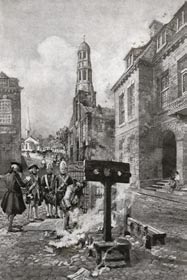
nor, contained ringing defenses of the right to publish,
November 18. It would be the only issue missed in its
authored by Alexander, such as this argument offered in
publishing history. The next week, with the help of
the second issue:
Zenger’s wife, Anna, the Journal resumed publication
The loss of liberty in general would soon follow the sup-
with an issue that included this “apology”:
pression of the liberty of the press; for it is an essential
As you last week were disappointed of my Journal , I
branch of liberty, so perhaps it is the best preservative
think it incumbent on me to publish my apology, which
of the whole. Even a restraint of the press would have
is this. On the Lord’s Day, the seventeenth, I was ar-
a fatal influence. No nation ancient or modern has ever
rested, taken and imprisoned in the common jail of this
lost the liberty of freely speaking, writing or publishing
City by virtue of a warrant from the Governor, the hon-
their sentiments, but forthwith lost their liberty in gen-
orable Francis Harison, and others in the Council (of
eral and became slaves.
which, God willing, you will have a copy); whereupon
Cosby put up with the Journal’s
I was put under such restraint that
Illustration depicting the burning of Zenger’s Weekly Journal
attacks for two months before con-
on Wall Street, November 6, 1734, on orders of New York I had not the liberty of pen, ink or cluding that it must be shut down.
governor William Cosby. The stockade in the foreground, paper, or to see or speak with people, The first effort to silence the Journal where two hands and a head of a standing man could be until my complaint to the honorable occurred in January 1734 when
shackled, reminds of the laws of that period.
Chief Justice at my appearing be-
Chief Justice DeLancey asked a
fore him upon my habeas corpus
grand jury to return indictments
on the Wednesday following. He
based on the law of “seditious
discountenanced that proceeding,
libel,” a law that allowed criminal
and therefore I have had since that
punishment of those whose state-
time the liberty of speaking thro’ the
ments impugned the authority and
hole of the door to my wife and ser-
reputation of the government or
vants. By which I doubt not you
religion, regardless of the truth of
will think me sufficiently excused
the statements.
for not sending my last week’s
The grand jury, however, re-
Journal, and hope for the future,
fused to return the requested
by the liberty of speaking to my ser-
indictments. DeLancey tried again
vants thro’ the hole of the door of
when another grand jury met in
my prison, to entertain you with
October. He presented the grand
my weekly Journal as formerly.
jurors with broadsides and “scan-
The enormous (in those
dalous” verse from Zenger’s Jour-
days) bail of £800 set for
nal, but the jurors, claiming that the
Zenger turned into an impor-
authorship of the allegedly libelous
tant tactical advantage for the
material could not be determined,
imprisoned printer. As a re-
again decided not to indict.
sult of his stream of “letters”
Cosby responded to these frus-
from prison, an outpouring of
trations by proclaiming a reward of
public sympathy for his cause
£50 for the discovery of the authors
developed.
of the libels and by issuing an order
that Zenger’s newspapers be publicly burned by “the
common hangman.” Then, in an effort to get around the
The Seditious Libel Trial
grand jury’s refusal to indict, Cosby ordered his attorney
general, Richard Bradley, to file “an information” be-
fore Justice DeLancey and Frederick Philipse, another
James Alexander, who – as the author of the opinions
justice. Based on the information, the justices issued a
that so offended Cosby – probably should have been
bench warrant for the arrest of John Peter Zenger. On
in the prisoner’s dock instead of Zenger, undertook with
November 17, 1734, the sheriff arrested Zenger and took
fellow lawyer William Smith the task of preparing the
him to New York’s Old City Jail, where he would stay for
printer’s defense. Both Alexander and Smith found
the next eight months.
themselves disbarred, however, in April 1735 by Chief
The Weekly Journal was not published the next day,
Justice DeLancey after they audaciously objected on the
4

grounds of bias to the two-man court Cosby had hand-
for that. Nay, indeed the law says their being true is an
picked to try Zenger’s case. Alexander recruited 60-year-
aggravation of the crime.” Bradley proceeded to offer
old Andrew Hamilton of Philadelphia, perhaps the ablest
a detailed and generally accurate account of the state of
and most eloquent attorney in the colonies, to argue
law on seditious libel of the time, supporting his conclu-
Zenger’s case. Hamilton relied heavily on Alexander’s
sion that the fact that libel may be true is no defense.
behind-the-scenes work, including a detailed brief of the
Andrew Hamilton rose to argue that the law ought not
argument that he prepared.
to be interpreted to prohibit “the just complaints of a
Jury selection began on July 29, 1735, and once again
number of men who suffer under a bad administration.”
Cosby attempted to influence events by having his
He suggested that the Zenger case was of transcendent
henchman, Francis Harison, produce a roll of potential
importance:
jurors that included 48 nonfreeholders. (Nonfreehold-
From what Mr. Attorney has just now said, to wit,
ers were persons holding estates at the will or sufferance
that this prosecution was directed by the Governor and
of the governor, who thus had considerable incentive to
the Council, and from the extraordinary appearance
produce a verdict that would please him.) The jury roll
of people of all conditions, which I observe in Court
also included former magistrates and persons in Cosby’s
upon this occasion, I have reason to think that those
employ. This departure from normal
in the administration have by this prosecution
procedures was too much even for Cosby’s
something more in view, and that the people
handpicked judges who, sitting behind an
believe they have a good deal more at stake,
ornate bench in their scarlet robes and huge
Hamilton
than I apprehended. Therefore, as it is become
white wigs, rejected the ruse. Twelve jurors
my duty to be both plain and particular in
were quickly selected.
had almost no this cause, I beg leave to bespeak the patience
law to support his
The trial opened on August 4 on the
of the Court.
main floor of New York’s City Hall with
Hamilton argued that the libel law of
Attorney General Bradley’s reading of the
position that the England ought not to be the libel law of
information filed against Zenger. Bradley
New York:
told jurors that Zenger, “being a seditious
truth should be a In England so great a regard and reverence is
person and a frequent printer and publisher
had to the judges that if any man strikes an-
of false news and seditious libels,” had
defense to the
other in Westminster Hall while the judges are
“wickedly and maliciously” devised to “tra-
charge of libel.
sitting, he shall lose his right hand and forfeit
duce, scandalize, and vilify” Governor Cosby
his land and goods for so doing. Although
and his ministers. Bradley said, “Libeling
the judges here claim all the powers and au-
has always been discouraged as a thing that
thorities within this government that a Court
tends to create differences among men, ill
of King’s Bench has in England, yet I believe
blood among the people, and oftentimes great bloodshed
Mr. Attorney will scarcely say that such a punishment
between the party libeling and the party libeled.”
could be legally inflicted on a man for committing such
After a brief statement from defense co-counsel John
an offense in the presence of the judges sitting in any
Chambers, Andrew Hamilton rose to announce that his
court within the Province of New York. The reason is
client – sitting in an enclosed box in the courtroom–
obvious. A quarrel or riot in New York can not possi-
would not contest having printed and published the
bly be attended with those dangerous consequences that
allegedly libelous materials contained in the Weekly
it might in Westminster Hall; nor, I hope, will it be al-
Journal and that “therefore I shall save Mr. Attorney the
leged that any misbehavior to a governor in The Plan-
trouble of examining his witnesses to that point.”
tations will, or ought to be, judged of or punished as a
Following Hamilton’s surprise announcement, the
like undutifulness would be to our sovereign. From all
prosecution’s three witnesses (Zenger’s journeyman
of which, I hope Mr. Attorney will not think it proper
associate and two of his sons), summoned to prove that
to apply his law cases, to support the cause of his gov-
Zenger had published the offending expression, were
ernor, which have only been judged where the king’s
sent home. There followed a prolonged silence. Fi-
safety or honor was concerned. ... Numberless are the
nally, Bradley spoke: “As Mr. Hamilton has confessed
instanc












